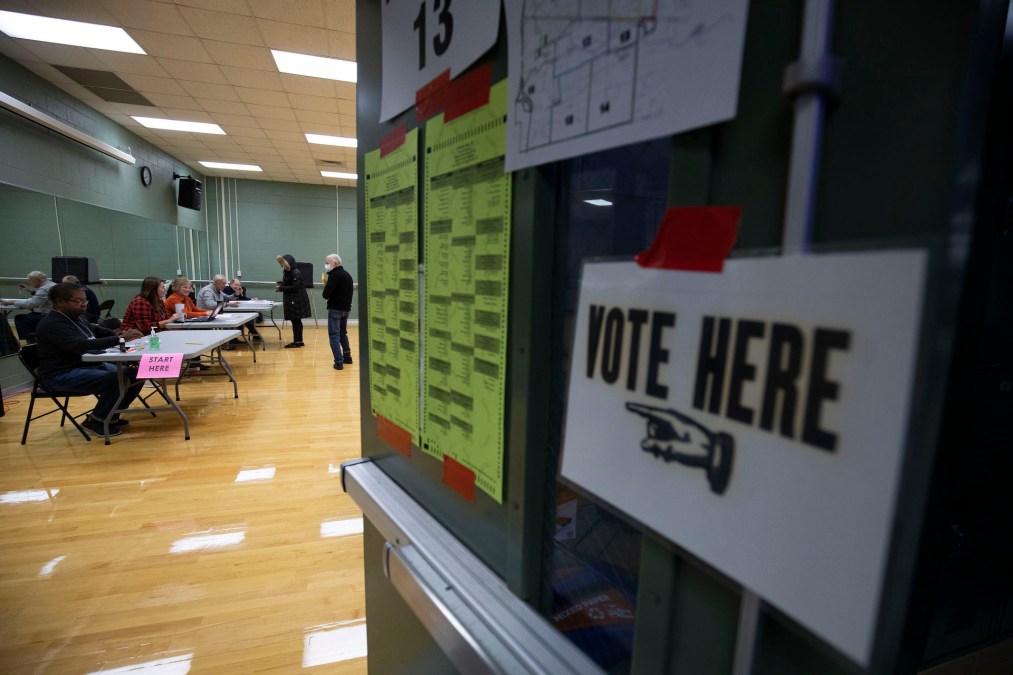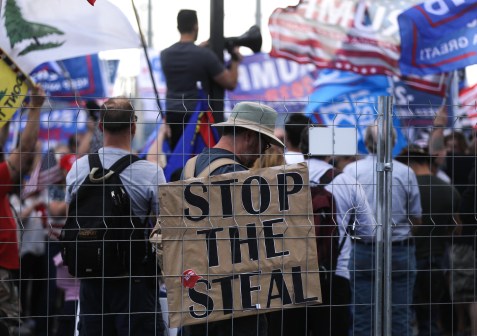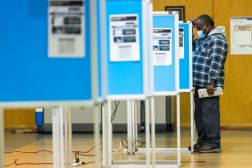Online disinformation fuels violent threats against poll workers

Election officials wearing body armor to oversee voting in Colorado. A poll worker in New Mexico who quit in July after a voter followed her home, nearly rear ending her vehicle. A note sent to Maricopa County, Arizona, election workers warning about “wire around their limbs” so they can be “tied and dragged by a car.”
As Americans head to the polls for pivotal midterm elections Tuesday, poll workers around the country are increasingly worried about their physical safety, concerned that a wave of online conspiracy theories accusing election administrators of rigging the vote will inspire violence against them.
Josh, a poll watcher in Bucks County, Pennsylvania, who declined to give his last name for security reasons, said “it’s hard not to be concerned” about his physical safety. “Weird, scary things happen in the world now,” he said.
Disinformation researchers and security companies say that discussion on the internet of violence against poll workers has surged in the run-up to the 2020 elections. In the three months leading up to Tuesday’s vote, online conversations about “violence against poll workers” spiked by 137% on Twitter, compared to the same time period before the 2020 election, according to an analysis carried out by the social-media monitoring firm Zignal Labs.
Across all social media platforms, discussions of “election violence” increased by 790% in October compared to the previous month. Conversations about violence against poll workers increased by 225% over the same time period.
Ahead of the election, voices on the far-right have mobilized their audiences to monitor polling sites and drop boxes in order to collect so-called “evidence” of voter fraud. Gateway Pundit, the hyper-partisan site banned from Twitter for spreading election misinformation, has been among the sites encouraging readers to go to polling places and take photos and videos of run-of-the-mill election activity. Stripped of context, photos and videos collected by these activists will likely be used to support false allegations of voter fraud.
Renee DiResta, research manager at the Stanford Internet Observatory, said she worries that people reading such posts will feel the “justified response is fighting back in some way.”
“The rumor will go viral, long before any kind of explanation or understanding of what has happened,” DiResta said. “That’s the concern — the speed and then the way in which it is processed in communities that are really riled up and had been told to look for mules or election workers colluding.”
With conspiracy theorists sometimes publishing names and photos of election officials alongside stories about supposed acts of fraud, election experts fear the possibility of violence directed toward poll workers.
“It’s hard not to be worried about physical security with everything that’s going on right now in the country,” said Larry Norden, senior director of the Elections and Government Program at the Brennan Center for Justice. “Unfortunately, we already have a lot of election denial going on from President Trump, from other very popular public figures, and that’s a toxic combination.”
In a briefing with reporters on Tuesday, a senior administration official speaking on condition of anonymity, described violence against poll workers as “my number one concern.”
Indeed, in advance of the election several former and current government officials have publicly worried about such violence.
Speaking at a Monday event hosted by The Washington Post, Chris Krebs, the former director of the Cybersecurity and Infrastructure Security Agency, said the 2020 Stop the Steal movement, which aimed to keep President Trump in office after his election defeat, has trickled down to local communities. The mobilization of individuals who believe in election fraud narratives is “not just performative, but also quite likely very dangerous,” raising “at least the possibility for political violence,” Krebs said.
“There’s no question that the lies of 2020 continue through today and will continue to push through ‘22 and into ‘24,” Krebs said.
This dynamic is on vivid display in Arizona, where President Biden’s victory in 2020 secured the presidency and where Trump and his allies have alleged widespread voter fraud without evidence — and continue to do so. In a five week span between July and August, Arizona poll workers received 140 violent threats and similar messages, according to documents obtained by Reuters. “You will all be executed,” one message read.
Also alarming election officials, armed vigilante groups are monitoring many Arizona polling places and ballot drop-boxes. “The false allegations and the conspiracy theories and all the dishonesty that goes on … if we don’t fight that off now, then our children will suffer because of it,” Maricopa County Sheriff Paul Penzone told the press Monday.
Disinformation researcher Kate Starbird said that often election-themed disinformation begins with a call to action in response to a supposed example of fraud uncovered. Those who believe election fraud claims have been encouraged to go to the polls and record what they see, resulting in what she describes as “participatory disinformation” efforts. “That process is actually creating new events around which new disinformation is created,” said Starbird, who co-founded the University of Washington’s Center for an Informed Public.
Niche encrypted messaging services and social media platforms such as Rumble, Gab, Parler and Truth Social have become ground zero for amplifying these narratives, experts say. These sites give users a place to post false information about elections and to cheer each other on, often without the type of content moderation regimes on more mainstream sites.
These alternative platforms are “where mobilization happens,” said Graham Brookie, senior director of the Atlantic Council’s Digital Forensic Research Lab. Brookie said his team is seeing warnings of violence against election workers “in spades” on these niche platforms and that these narratives risk traveling from smaller online communities to more mainstream ones.
Telegram is one such platform used to mobilize ahead of Tuesday. “All assets deployed tomorrow,” said a Telegram post on Monday that appeared on the Wisconsin Election Integrity forum. “False flags, delayed vote count, pipe bursts, dead voters, fake ballots, electronic voting systems being rigged. Tomorrow they commit treason for the second time.” The post was shared nearly 80,000 times, fueling extensive discussion about Democrats stealing votes and the need to fight back.
The near total absence of content moderation on platforms like Telegram and Truth Social allows rumors to propagate that ultimately seep into the content on mainstream platforms, giving them wider reach after they’ve incubated on the fringes, said Stephen Prochaska, a PhD student at the University of Washington studying misinformation and disinformation.
These platforms allow users to “talk about election conspiracy theories openly until you have a feeling that most of the people with you are in agreement,” Prochaska said, spawning what he calls a “more aggressive rumor.”
Update: This story was updated on Nov. 8, 2022 with comments from a senior administration official.




